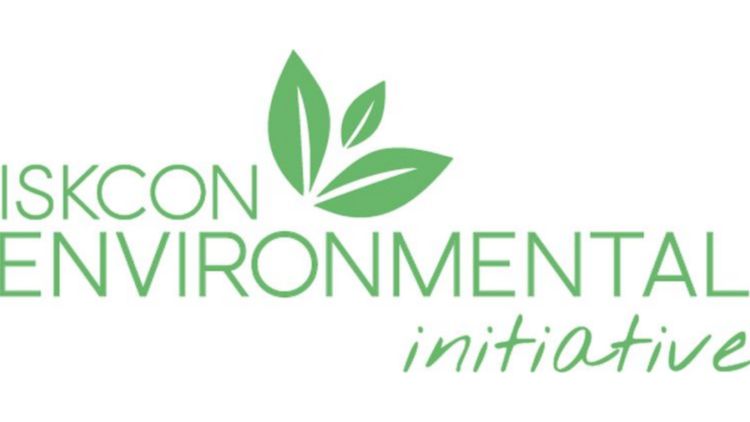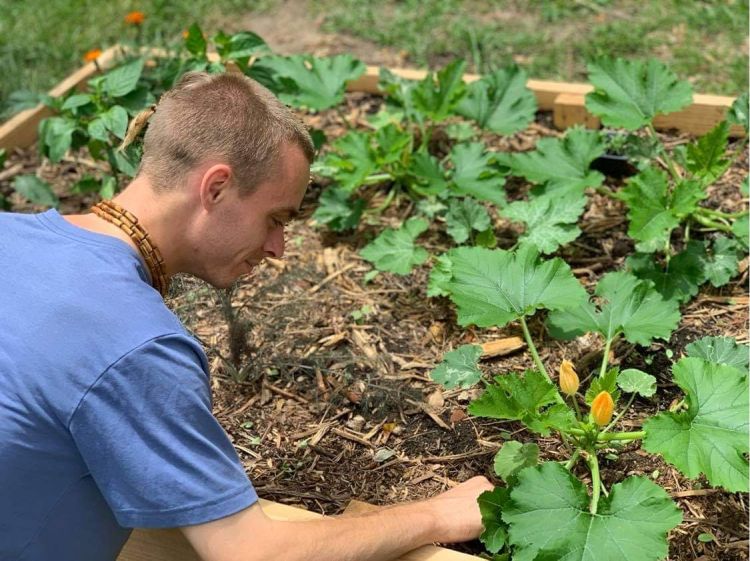ISKCON Environmental Initiative Guides Temples in Implementing Environmental Practices
By Madhava Smullen | May 01, 2021

On Earth Day (April 22nd, 2021), ISKCON’s North American Council passed a resolution endorsing the work of the ISKCON Environmental Initiative (IEI), and encouraging “adoption of the environmentally sustainable practices promoted by the IEI by all ISKCON temples and communities.”
The IEI, which has developed guidelines for these practices over the past year, is an international team of devotees specializing in environmental concerns, including Anuttama Das, GBC and Global Minister of Communications; Dr. Christopher Fici, Ph.D (Krishna Kishore Dasa), who holds a doctorate in Religious Studies; Dr Ramesh Goel, Ph.D (Ras Vilas Das), Professor of Environmental Engineering, University of Utah; Dr Sreenivasulu Chadalavada, PhD (Shyamananda Krishna Das), Professor of Environmental Engineering, University of Newcastle; Sanjay Gupta, former trustee of Bhaktivedanta Manor in the UK; and Allegra Lovejoy, current Masters student in Environmental Management at Yale University.
The North American Council is encouraging the leaders of ISKCON North America to apply the practices set out in two guides IEI has released for ISKCON: “Three Tiers of Environmental Practices” and “The Ecotheology of our Tradition.” These are inspired by Srila Prabhupada’s Sixth Purpose for ISKCON, which includes the aim to teach a “simpler, more natural way of life.” Links to both documents are available at the bottom of this article.
The Ecotheology of our Tradition, a 10-page treatise by Krishna Kishore Das on the importance of theologically-based environmentalism, illustrates “that care of creation is an essential and indispensable part of the Caitanya Vaishnava tradition and therefore needs to be an integral part of the culture of ISKCON.”
Quoting Srila Prabhupada, scriptures such as the Sri Chaitanya Charitamrita, and various ISKCON scholars, the paper explains that “Because material creation emerges from the Supreme Personality of Godhead, we have a duty to live in harmony with material creation.” Krishna Kishore quotes the Sri Isopanisad’s instructions on such harmony: “Everything animate or inanimate that is within the universe is controlled and owned by the Lord. One should therefore accept only those things necessary for himself, which are set aside as his quota, and one should not accept other things, knowing well to whom they belong.”
Meanwhile in “Three Tiers of Environmental Practices,” the IEI offers guidelines for temples and communities, highlighting important steps to take in five areas: Food; Energy; Waste Management; Water; and Education, Outreach and Culture. The first tier encourages entry-level sustainability practices. The second tier encourages practices that require significant commitment from a temple. And the third tier includes advanced practices for those fully dedicated to living Krishna Conscious environmentalism.
“We urge ISKCON temples, communities and where applicable, individuals, to implement the Tiers as practical steps to achieve progressive levels of Krishna Conscious Environmentalism,” the team writes. Participating temples will choose a tier as a goal and work together with the IEI team to achieve it.
Steps in Tier One include efficient use of food/bhoga via smart purchasing, inventory control, and storage; performing an energy audit of existing buildings with the help of local agencies; developing a waste management plan for recycling, compost and landfill-destined waste; reducing water usage; and indentifying a Sustainability Coordinator.
Steps in Tier Two include growing vegetables in a temple garden or buying local; choosing Energy Star-certified appliances; comprehensive recycling; encouraging devotees to use their own plates, water bottles and containers at the temple; and including environmental consciousness in adult and youth education.
Tier Three includes advanced commitments, such as sourcing fully renewable energy; sourcing fully local or organic bhoga; sourcing milk from protected cows; and other advanced efforts to minimize consumption and waste. Temples aspiring for Tier Three may serve as demonstration sites to share Krishna Conscious environmentalism with local colleges, agencies, and the public.

Bhakta Danny tends the temple’s garden at ISKCON Tallahassee, summer 2020. The garden provided bhoga and flowers for the Lord and was a major talking point with visitors.
The IEI clarifies that these are guidelines, not mandates. “For some communities, Tier One will be the goal to be achieved over one or two years of concentrated effort,” the document explains. “Other communities will have many Tier One standards in place, and we recommend they strive to achieve Tier Two, or as much of Tier Two as they can reasonably accomplish. Tier Three demonstrates a high level of eco-sustainability that, while feasible for many rural communities, may not be possible for most urban temples. Yet, we urge all our communities to gradually work towards Tier Three and to implement as many of its standards as possible.”
“Society today is much more complicated than it was even 100 years ago, and it’s not easy to identify how to put ‘simple living and high thinking’ into practice,” comments IEI North American Coordinator Allegra Lovejoy. “Most of us live some sort of mix of consumer culture and Vaisnava culture, so we can be habituated to a high-consumption and high-waste lifestyle personally, as well as in our temple operations. This initiative sets out straightforward ways to put simple living and high thinking into practice – both for temples and for households – identifying clear strategies for waste and consumption reduction, and creating a more earth-honoring culture.”
On Saturday May 1st, Allegra and Anuttama Das are set to make a Zoom presentation to North American temple presidents about the initiative. The project has also been presented to the global GBC with hopes that they will endorse it as well.
Next, the ISKCON Environmental Initiative will be looking to mobilize national and local green teams to help encourage local temples to put their guidelines into practice, and to spread beyond North America.
In the future, the team will be developing “Green Temple Awards” to recognize those communities that have achieved significant results in implementing the guidelines and caring for the Earth.
“Enacting our environmental values is critical to ISKCON’s relevance to young people in the 21st century,” Allegra says. “We welcome community leaders and temple administrators to reach out to get involved. Many temples are already doing some ecologically sustainable practices, but could potentially use some help to go further. A key issue is often having a dedicated sustainability coordinator on the ground – a temple resident, staff member, or active volunteer who is committed to working on this long-term, or a small team. The local sustainability coordinator would work with a member of our team to conduct a Green Audit of the temple based on the Sustainability Tiers and identify aspects that are going well, and areas that need more work, and to set goals. Our team would provide support as needed while the sustainability coordinator works towards those goals. Once a temple has achieved their benchmarks, they earn a Green Award and can even serve as a role model for others.”
At a later point, Allegra says, IEI will also offer educational resources and tip sheets to households who wish to take up similar practices.
Radhika Ramana Das (Dr. Ravi Gupta), one of a number of ISKCON scholars who have also endorsed the initiative, encourages devotees to get involved.
“Care for the environment is deeply embedded in Gaudiya Vaishnava theology and practice,” he writes. “Given the state of the world’s ecosystems, it is essential that Vaishnavas put these principles into practice, both among ourselves and in the communities that we inhabit. The ISKCON Environmental Initiative (IEI) is a much-needed and appreciated step in this direction, and I commend the initiative wholeheartedly.”
Read The Ecotheology of our Tradition here: https://tinyurl.com/etheology
See the Three Tiers of Environmental Practices here: https://tinyurl.com/tiers2021
See the North American Council’s resolution Regarding the ISKCON Environmental Initiative here: https://tinyurl.com/IEINAC21
Those interested in getting involved can contact IEI at greenteam@iskcon.org or visit the website www.iskconenvironment.org, which is scheduled to be online by mid-May.
IEI welcome inquiries from temples, community members, and those interested in volunteering as sustainability coordinators.















